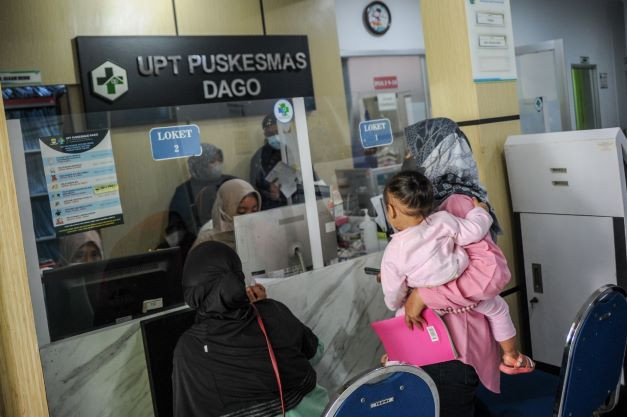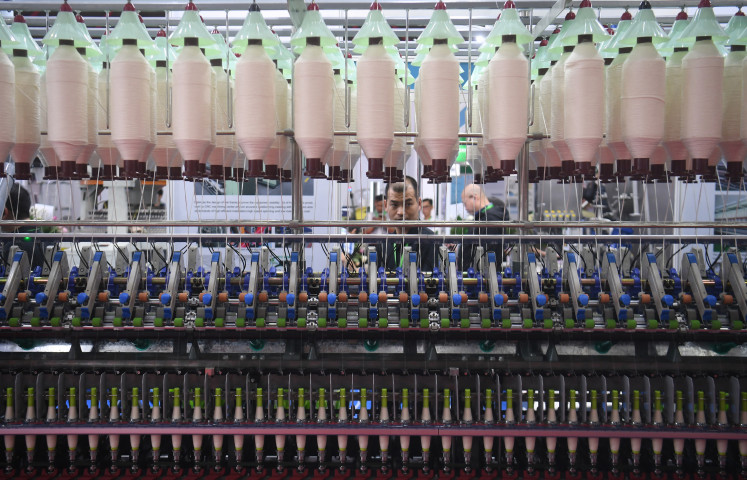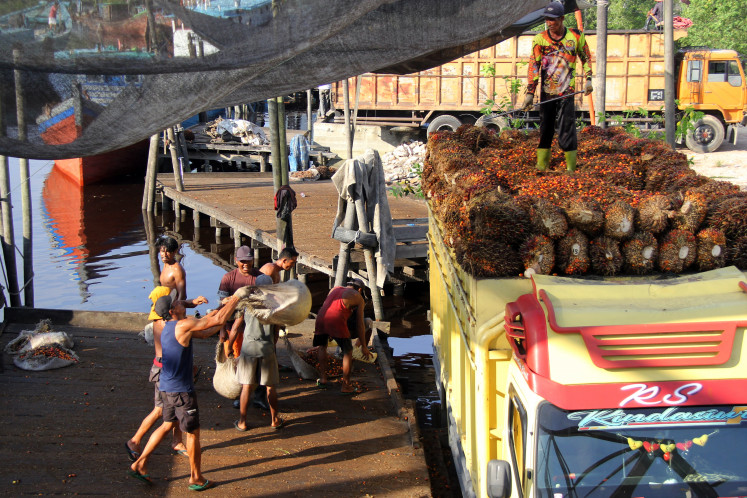Popular Reads
Top Results
Can't find what you're looking for?
View all search resultsPopular Reads
Top Results
Can't find what you're looking for?
View all search resultsMother's multi-role: Reverse domestic stigma and urgency of women’s education
World Bank stated Indonesia had made considerable progress toward gender equality over the past decade, with improved rates of literacy, school enrollment and employment, as well as policies to pave the way for a more gender-equitable society.
Change text size
Gift Premium Articles
to Anyone
I
ndonesia achieved gender parity in education participation at the national level in 2019, with a GPI of 1.00 for school enrollment rates of children 7-12 years old. Therefore, World Bank stated Indonesia had made considerable progress toward gender equality over the past decade, with improved rates of literacy, school enrollment and employment, as well as policies to pave the way for a more gender-equitable society. Does it benefit women?
Some stigma about education for girls remains
Enrollment in education, literacy and employment for females in Indonesia are increasing. However, there is still some stigma, a belief that education for girls is unimportant, as if they will be housewives who fulfill "only" domestic roles of childbearing, cooking and serving the husband.
Data from the National Socioeconomic Survey (SUSENAS) in 2017 show the primary reasons for female students dropping out of school compared to males are being married and taking care of the household. Thus, it is assumed current education is enough. Those domestic roles are labeled as a housewife's duty, which is given, and they are expected to be carried out smoothly, without proper education needed. Socially, it seems like a simple task with less risk than that of a father who works outside. In the past, the father worked by hunting, gathering and struggling with external challenges to protect the family. Thus, the public and domestic division of labor. Latterly, with better gender parity in education, how does this impact gender roles?
Even as societies shift into modern culture, the viewpoint that girls should not be in school has remained. Indonesia has a high number of child marriages, with economic hurdles as the major reason, which is likely intertwined with dropping out; being in school postpones the economic benefit of being a wife who gets financial support from the husband. Moreover, there is no need for a higher education certification to become a child laborer or migrant worker, which seem like rational options, compared to being in school with no immediate economic return. Moreover, the subjects taught at school are considered irrelevant to the knowledge needed at home to become a housewife. Thus, school is considered not to be beneficial for girls, even though school culture includes hidden curricula like personal soft skills such as decision-making capability, skills in delivering opinions and confidence, as well as larger impacts, such as the level of lifetime earnings and decreasing child and maternal mortality.
Mother’s burden and childcare arrangements
The pandemic brings education from public spaces closer to home, a game changer for the arrangement of domestic roles. The COVID-19 pandemic has prolonged the mad morning rush into a day-long effort for mothers to prepare their children for school. Now, the learning process happens at home. It has never been imagined before that the mother would have a duty to be a teacher, inadvertently. During the pandemic, more than 68 million students in Indonesia, from the preprimary to tertiary levels, have been affected by school closures (UNESCO, The Jakarta Post, 2020). The COVID-19 pandemic has profoundly and suddenly impacted many areas of life, work and family alike. These changes have also affected the educational process in formal and informal learning environments (frontiersin.org, 2021). It impacts the parents as the primary socialization agent, who have a central role in implementing learning from home during the pandemic. Unfortunately, the burden of assisting children's learning during the pandemic falls more on mothers than fathers.
When it comes to household responsibilities, women perform far more cognitive and emotional labor than men (BBC, 2021). Specifically, 66.7 percent of child assistance in Indonesia is still predominantly carried out by women (Education Ministry, 2020). The Indonesian Child Protection Commission (KPAI) told the Post in July 2020 about the unequal division of labor and the mental load shouldered by mothers.
Furthermore, the Lentera Pustaka TBM survey stated 71 percent of mothers felt overwhelmed and inconvenienced by distance learning. Mothers complained about the many tasks and roles that must be done to complete children's school homework and household chores (Kumparan, 2020). A program management specialist at United Nations Women in Indonesia, Lily Puspasari, said during times of crisis, women were often burdened with greater expectations to carry out domestic responsibilities, with school closed. Disruptions at the workplace became the norm, including working from home; there were bound to be more roles expected from women (the Post, 2020).
Psychological stress mainly occurs in mothers with children of primary school age or under (Prados et al. l., 2020), not to mention in mothers working outside the home. Niken, a five-month pregnant mother, must help with her kindergarten son's homework, such as written tasks, arts and crafts or practical assignments. It must be well-documented in pictures or videos, which are supposed to be submitted daily to the teachers. She must do it straight after work while pregnant, which makes her want to pass out (the Post, 2020). Similarly, in the United States, women carried more weight than men in childcare during the COVID-19 crisis, even though they were working.
The opposite impact: Creating triple burden
The Indonesian government's effort to improve education quality includes massively increased access to higher education through the Indonesian government scholarship (LPDP) and better governance of the education development field. However, more is needed to acknowledge women's educational attainment to support their productivity and the necessity of having a joint role in educating children. With the rise of women's employability and their significant contribution to the family finances, it is assumed women will have a more balanced role in the family, not the other way around. A mother carries a triple burden: workload, household chores and emotional burden in maintaining the family's emotions. As maternal gatekeepers, even though the parents decide, the mother does more anticipation, planning and research (BBC, 2021). Female participation in the labor market is much greater than ever before, yet they still spend twice as much time on domestic duties and childcare as men. Thus, fathers need to step up, not only to help the mother, but to be fathers and joint parents: to be available physically and mentally for their children, not only provide money.
What can be done
As per the National Civil Service Agency Regulation No. 24/2017, male civil servants in Indonesia are eligible for one month of paternity leave, receiving their basic pay during this time, with two days’ paternal leave given to the private sector (Labor Law No. 13/2003.). It is still in process that male employees in Indonesia may get up to 40 days of paternity leave after the birth of a child as proposed in the maternal and child welfare bill (RUU KIA). These effort place Indonesia as second in ASEAN countries, after the Philippines, which gives 14 days of paternity leave.
As the physical separation of working space is no longer available, having school-aged children while working at home can be daunting. Therefore, companies should allow flexibility so mothers can fully concentrate during the meeting and take care of their family when it has done. That way, they can fulfill their role as employees and mothers without experiencing guilt in choosing the more important one. The state that supports working moms is supporting family resilience, which, in turn, will invest in human capital in the long run, for example, by providing one hotel room for the family if they work outside the house overnight.
On the micro-level, Indonesia has the strength of having extended family as social support to watch the kids in order to alleviate the mother’s burnout, which does not happen much in other countries. Additionally, it should also provide family education for the children and all family members to understand their multiple roles and participate in house chores together.
***
The writer is a researcher at National Research and Innovation Agency.










